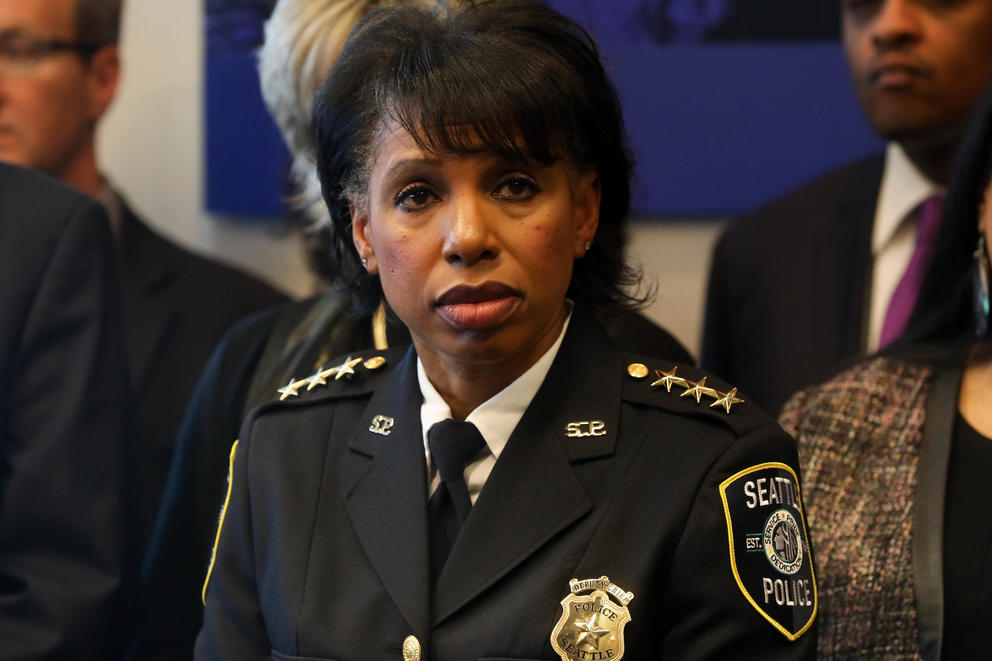“I do believe that we have to make arrests in some cases and people are going to engage in criminal behavior, but an arrest is not going to help with homelessness,” she said. “I don’t want people to conflate the two things, which we continue to do. If we arrest a person and they have a problem, whatever it is, and they get out in one day, ten days, 100 days, 8 months, they still have a problem.”
As Seattle and cities up and down the West Coast continue to struggle with increasingly large homeless populations, law enforcement officials are often the first responders to the crisis. While homelessness and the criminal justice system have long overlapped, the sheer number of interactions police are having with people on the street or in shelters is steadily on the rise. In 2016, Seattle police booked people considered homeless into jail on 1,929 occasions, according to SPD data; in 2018, that number was 3,211.
How those interactions between law enforcement and people struggling with homelessness should play out have been the focus of an increasingly fierce debate. For some, arrests of homeless people have exacerbated the problem, making it harder for people to get out of their current situations. Others perceive a police force rendered “impotent” in the face of the growing problem, as was portrayed in Seattle Is Dying, a recent hour-long reported commentary from KOMO 4 TV.
Best’s comments on Thursday were the first since the airing of that story and a widespread, but false rumor about an at-large homeless murderer stoked impassioned conversation online. Asked Thursday about the large numbers of homeless people booked into jail — 1 out of every 5 bookings last year — Best highlighted that split within the city.
“We have to step up and we have to take some action,” she told attendees of the monthly meeting of the Seattle/King County Coalition on Homelessness. “Sometimes that does end up in arrest; sometimes that does end up in deferral, often more times than you think. On the other side, I’ll go to a meeting and there’s a whole other segment who really can’t understand why we don’t arrest every single person. And I’ve actually heard that.”
For the last six years, much of the scrutiny on the Seattle Police Department has centered on the 2012 agreement with the Department of Justice to reform use of force policies. But with the end of that agreement in sight and homelessness topping Seattle voters’ list of concerns, attention has shifted toward the intersection of law enforcement, homelessness and the broader criminal justice system.
Best described the position in which the crisis has placed officers as regrettable.
“The fact of the matter is I feel like we’re working with a lot of systems that really haven’t reached their full potential, so that officers end up on the front lines of all of this stuff that we don’t need to be at the front lines of,” she said. “A lot of times we have to be mental health providers or work on drug addiction issues, but that is the state of the city.”
The problem, she said, is made worse by the fact of SPD’s struggles to retain and attract officers.
SPD has made strides toward adjusting to the new reality of how often it interacts with the homeless population. A team of officers makes up part of the Navigation Team, which pairs with outreach workers to carry out encampment cleanups and outreach. The department also participates in the Law Enforcement Assisted Diversion program, to divert people away from the criminal justice system before they’re even arrested. The department also employs one mental health professional and has a Crisis Response Team for incidents involving someone in a mental health crisis.
But while Best said the police department is increasingly aware of its role in the homelessness crisis, she maintained that the solutions must come from elsewhere.
“One of the things I tell people all the time is that these issues, particularly the societal issues, while we’re a part of it … this is not a police issue,” she said. “This is an issue that’s going to take multi-faceted folks to approach and deal with.” Among the issues that need addressing, Best named more affordable housing, a robust mental health system outside of incarceration and addiction treatment.
Best has only occasionally spoken at length about homelessness; even Thursday, she was surprised to be doing more than just listening. But as a kind of preamble to upcoming city council elections, recent events have inflamed pre-existing tensions.
If Best had any one takeaway, it was this: “I really don’t think the criminal justice system is the place to put [homeless people]. But so far, no one [system] has stepped in to do the work that needs to be done.”



